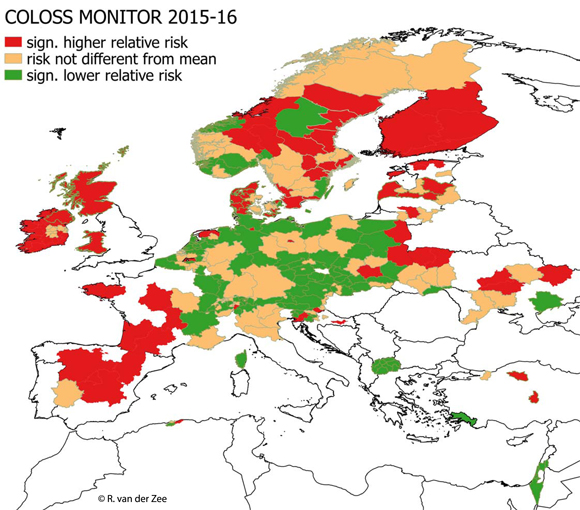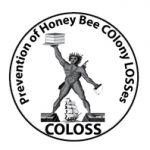Preliminary results from an international study
The honey bee research association COLOSS1 has today announced the preliminary results of their international study of colony losses over the 2015-16 winter. Data were collected from 29 countries in this initiative, which is the largest and longest running international study of honey bee colony losses. In total 18,693 respondents provided overwintering mortality and other data of their colonies. Collectively, all responding beekeepers managed 399,602 honey bee colonies. The overall proportion of colonies lost was estimated as 11.9 %.

Co-Chairs of the COLOSS Core project for colony losses monitoring Dr Alison Gray and Dr Robert Brodschneider say: “These loss rates vary considerably between countries. In this year’s survey the highest losses were found in Ireland and Northern Ireland, followed by Wales and Spain. The pattern of loss rates differs from last year, when higher mortality and loss rates were found in central Europe and countries to the east. This year the higher loss rates tend to be in the west and northern countries, although Spain had high rates of loss in both years. All the loss rates quoted here include losses due to unresolvable queen problems after winter, as well as colonies that died over winter for various reasons. Losses due to queen problems were unexpectedly high in some countries and this will be a matter of further investigation.”
The protocol used to collect this COLOSS data has been internationally standardized2,3 to allow comparisons and joint analysis of the data. A more detailed analysis of risk factors calculated from the whole dataset , as well as further colony loss data from other countries, will be published later in the year.
Romée van der Zee of the COLOSS Core project for colony losses monitoring says: “Spring and early summer (March-July) were cold in Norway, Scotland, Sweden, Denmark and Ireland, with mean temperatures ranging from 12.8 – 14.4 °C. This may have had negative effects on colony development, resulting in both relatively high numbers of dead colonies and unsolvable queen problems after winter. A more detailed analysis may reveal the effects of other important factors, such as the role of the honey bee parasite Varroa destructor.”
Footnotes
1. COLOSS is a honey bee research association formerly funded by the European Union COST Programme (Action FA0803) and currently by the Ricola Foundation – Nature & Culture, which aims to explain and prevent massive honey bee colony losses. COLOSS does not directly support science, but aims to coordinate international research activities across Europe and worldwide, promoting cooperative approaches and a research programme with a strong focus on the transfer of science into beekeeping practice. COLOSS has 781 members drawn from 91 countries worldwide. Its President is Prof. Peter Neumann of the University of Bern, Switzerland.
Website http://www.coloss.org/
1. The standard protcols are available in The COLOSS BEEBOOK . Volumes 1 and 2 are available online at: http://ibrabee.org.uk/index.php/component/content/article?layout=edit&id=3664
3. The COLOSS BEEBOOK Volume 2 is available in hard copy from:-
http://ibrabee.org.uk/index.php/component/k2/item/3028
4. Press release written by:-
International Data Co-ordinator and Co-Chair, COLOSS Core project for colony losses monitoring:
Dr Alison Gray, Department of Mathematics and Statistics, University of Strathclyde, Glasgow G1 1XH, UK. Tel: +44 (0) 1415484335; Email: a.j.gray@strath.ac.uk
COLOSS Core project for colony losses monitoring: Romée van der Zee, Netherlands Centre for Bee Research, Tersoal, Netherlands. Tel: +31 515521107 / +31 615525784
Email: romee.van.der.zee@beemonitoring.org
Co-Chair, COLOSS Core project for colony losses monitoring: Dr Robert Brodschneider, University of Graz, Institute of Zoology, Universitätsplatz 2, A-8010 Graz, Austria. Tel: +43 316380-5602 Email: robert.brodschneider@uni-graz.at
COLOSS Press Officer: Norman Carreck, International Bee Research Association, University of Sussex, BN1 9QG, UK. Tel: +44 (0) 1273 872587 / +44 (0) 7918670169
Email: norman.carreck@btinternet.com

Schwarzenburgstrasse 161,3003 Bern, Switzerland.
Tel: +41 (0) 31 323 8227
Email: coloss.network@gmail.com